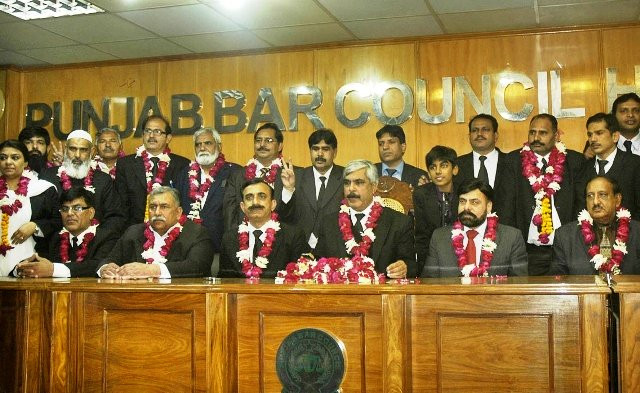Legal division: PBC bodies fall victim to internal discord
Standing bodies have been non-functional for more than five months

Newly elected representatives of Pakistan Bar Association in Lahore. PHOTO: ONLINE
The process of enrolment of lawyers as advocate to the Supreme Court has been on hold since August last year. Moreover, in the absence of such committees no proper check has been maintained over the mushroom growth of law colleges in the country.
Legal experts say the main reason behind the non-functioning of the apex regulatory body of lawyers is a tussle that is going on between the two groups in the superior bar.

They believe instead of resolving their internal issues, both the groups have been involved in litigation in superior courts regarding reconstitution of the committees.
A senior lawyer, who is member of the council, told The Express Tribune that money has been used to buy voters in Punjab during the last PBC election. He revealed that there were 75 voters in the province, where 35 had sold their votes by pocketing millions of rupees.
“When a member has been elected after paying millions of rupees, he secures his interests in the PBC. That’s why the standard of the regularity body is deteriorating,” says one PBC’s member, who was also elected from Punjab.
The PBC performs its functions through 20 standing committees that have majority group members as representatives. The sitting 23 members of the PBC were elected in December 2015 for five years.
In January last year, the Hamid Khan Group got the one-vote majority in the council, enabling it to constitute all 20 standing committees. However, the Asma Jahangir Group had managed to get the majority in the first week of September 2016. It then reconstituted the committees.
However the Hamid Khan Group challenged the reconstitution of the committees in the Islamabad High Court, wherein they got interim relief in their favour on September 9, 2016.
In October, the IHC issued the judgment in the case, dissolving all standing committees and asked the group to settle the dispute on its own.
The Hamid Khan Group approached the Supreme Court against the IHC’s verdict. The SC on October 25, 2016, stopped the council to form committees till its final verdict.
A three-judge SC bench, headed by Justice Sheikh Azmat Saeed and comprising Justice Umar Ata Bandial and Justice Faisal Arab, reserved its judgment after hearing the counsels for both the groups in November.
Since then the committees have been non-functional. However, the council has elected its new vice-chairman last month.
Shoaib Shaheen, a member of the Hamid Khan Group, admits that the legal fraternity has been facing immense difficulties for last five months.
He says that no lawyer has been enrolled as SC advocate since August last year, adding the previous committee had got interviews of more than 900 lawyers, and from January to August 2016, around 300 lawyers had been enrolled as advocates.
Shoaib added that lawyers were also disturbed over the situation and had been compelled to approach the higher judiciary to redress their grievances.
Azam Nazeer Tarar, a member of the Asma Jahangir Group, also said: “That’s going to be the first time in the bar council’s 43-year history that committees are non-functional for more than five months.”
Published in The Express Tribune, February 6th, 2017.



















COMMENTS
Comments are moderated and generally will be posted if they are on-topic and not abusive.
For more information, please see our Comments FAQ